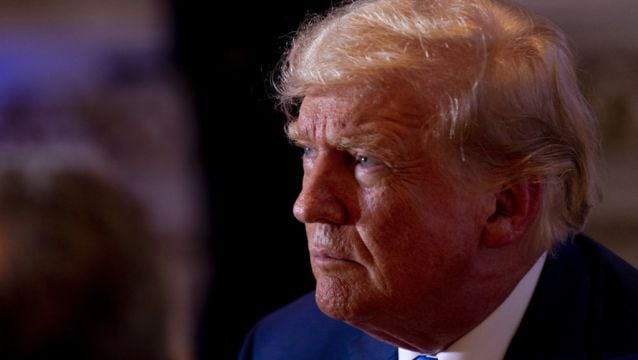Donald Trump could be charged in New York as soon as this week for allegedly covering up hush money payments to a porn star during his 2016 presidential campaign, nearly seven years after the money changed hands.
But any trial of the former US president would still be more than a year away, legal experts said, and could coincide with the final months of the 2024 presidential campaign as Mr Trump seeks a return to the White House.
In a social media post on Saturday, Mr Trump said he expected to be arrested on Tuesday and called on his followers to protest, though a spokesperson later said Mr Trump has not been notified of any pending arrest.
Manhattan District Attorney Alvin Bragg has presented evidence to a New York grand jury about a $130,000 (€120,000) payment to porn star Stormy Daniels in the waning days of the 2016 presidential campaign in exchange for her silence about an alleged affair, according to sources.
Mr Trump has denied the affair, and his lawyer has accused Daniels, whose real name is Stephanie Clifford, of extortion.
Were he charged, Mr Trump would become the first former US president to face criminal prosecution. Polls show him leading other potential rivals for the Republican nomination, including Florida Governor Ron DeSantis, who is widely expected to mount a White House bid.
The average criminal case in New York takes more than a year to move from indictment to trial, said Karen Friedman Agnifilo, former Manhattan chief assistant district attorney, and Mr Trump's case is far from typical.
That raises the possibility of Mr Trump having to stand trial in the middle of the 2024 presidential campaign, or even after Election Day, though putting a president-elect or president on trial for state charges would enter uncharted legal waters. If elected, he would not hold the power to pardon himself of state charges.
"This is so unprecedented that it's hard for me to say," Ms Agnifilo said when asked whether a judge would put Mr Trump on trial close to the election. "I think it's tricky."
The New York case is one of several focused on Mr Trump, including a Georgia election interference probe and a pair of federal investigations into his role in the January 6yj, 2021, assault on the US Capitol by his supporters trying to overturn his defeat and into his retention of classified documents after leaving the White House.
Challenging the case
In his early career in real estate, as a television celebrity and then in politics, the famously litigious Mr Trump has employed aggressive counter-attacks and delay tactics when confronted with legal challenges.
Mr Trump has accused Mr Bragg, an elected Democrat, of targeting him for political gain and could try to seek dismissal of the charges on those grounds.
Mr Trump would likely pursue other avenues as well, some of which could present thorny legal issues that take time to resolve.
While serving as president, Mr Trump reimbursed Mr Cohen for the Daniels payments, and federal prosecutors who charged Mr Cohen said in court papers that the payments were falsely recorded as for legal services. The New York Times, citing sources, has reported the most likely charges against Mr Trump would be for falsifying business records, typically a misdemeanour.
To elevate that charge to a felony, prosecutors must prove that Mr Trump falsified records to cover up a second crime. One possibility, according to the Times, is that prosecutors could assert the payment itself violated state campaign finance law, since it was effectively an illegal secret donation to boost his campaign.
Using state election law to elevate a false business record charge is an untested legal theory, experts said, and Mr Trump's lawyers would be sure to challenge it.
Mr Trump could also challenge whether the statute of limitations - five years in this instance - should have run out. Under New York law, the statute of limitations can be extended if the defendant has been out of state, but Mr Trump may argue that serving as US president should not apply.
"There's a whole host of possibilities," said David Shapiro, a former FBI agent and prosecutor and a lecturer at the John Jay College of Criminal Justice in New York. "This is a dream case for defense attorneys."
Finderprints and mugshot
In the near term, any indictment would require Mr Trump to travel to the district attorney's office in downtown New York to surrender. In white-collar cases, the defendant's lawyers and prosecutors typically agree on a date and time, rather than arresting the person at home.
Mr Trump would have his fingerprints and mugshot taken and would appear for arraignment in court. He would likely be released on his own recognisance and allowed to head home, experts said.
Mr Trump's lawyer, Joe Tacopina, told CNBC on Friday that Mr Trump would surrender if charged. If Mr Trump refused to come in voluntarily, prosecutors could seek to have him extradited from Florida, where he currently resides.
In an ironic twist, Mr DeSantis would typically have to give formal approval for an extradition demand in his capacity as governor, though Florida legal experts said his role would be strictly administrative.







